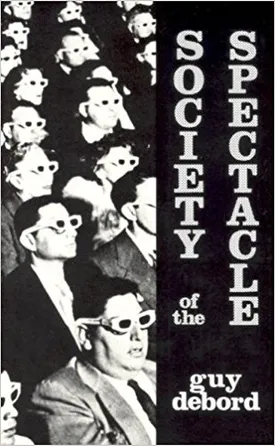Guy Debord
Guy Debord was an author, philosopher, and filmmaker, who has had an immense impact on the development of post-modernism, with his works being focused on contrasting the culture of his time with his own definition of ‘true’ culture. Born in Paris in 1931, Guy Debord had various influences during his life, most notably those of surrealism, early-20th-century revolutionary thinking, and his interests in art and photography. He is best remembered for his 1967 work 'The Society of the Spectacle', a pamphlet which is often seen as the 'mantra' of post-modernism.
Initially, Guy Debord joined the Lettrist movement in Paris in 1952, introducing a new, radical form of art which integrated literary, visual, and dramatic elements. Debord's style often focuses on the pressures of late capitalism in western society, using methods of critique which made him a target of both government and the public. Throughout his life, Debord's writings continuously focused on the anti-bourgeois and anti-capitalist message, with his ideas extensively discussed in literature, art and film courses throughout the world.
At the height of his success, Guy Debord released his best work, 'The Society of the Spectacle', in 1967. This work is a critique of the state of post-industrial societies, and is cited by many historians as the 'mother of post-modernism'. Debord reasoned that a person's life in these societies became one of a commodified self, and that money and commodities often took precedence in everyday life. He argues that those who are able to physically dominate and control these societies can remain safely removed, doing the majority of the economic 'work' themselves and keeping the majority of the population enthralled in 'spectacles'.
The main concept of 'The Society of the Spectacle' is the idea of the 'spectacle', a condition in which 'social life is mediated through a hierarchy of images, objects and people'. This condition is created as a result of unchecked capitalism, which in turn has removed meaningful social interaction from the lives of those living in increasingly expensive and populous societies.
The idea of the ‘spectacle’ was advanced by the 'situationists', a group of artists and activists for whom Guy Debord served as a leader. This philosophical movement argued that elements such as architecture, images and advertising acted as a form of political control, manipulating people into behaving in a certain fashion, and into behaving docilely in the face of a powerful, hegemonic structure. Through the situationists, Guy Debord argued for a form of conscious revolution against the society of the spectacle, advocating the overthrow of the dominant industrialist society in favour of a utopist vision of artistic freedom.
Though the situationists had a large impact on the world of art and social thought, they eventually disbanded in 1972. This did not, however, end Debord's career as a writer and philosopher, as his works remain significant today in the debates as to the negative effects of capitalism and information saturation on the modern person.
In the end, Guy Debord died in Paris on the 30th November, 1994, leaving behind a labyrinth of works, critiques, and revolutionary ideas. His works, such as 'The Society of the Spectacle' remain highly influential in understanding the modern society, and for their continued critique of the unchecked consumption which characterizes post-industrial societies. To this day, his works are studied in academic circles, providing readers with a sharp analysis of the commodified self, and the effects of post-modern consumer culture on everyday life.

